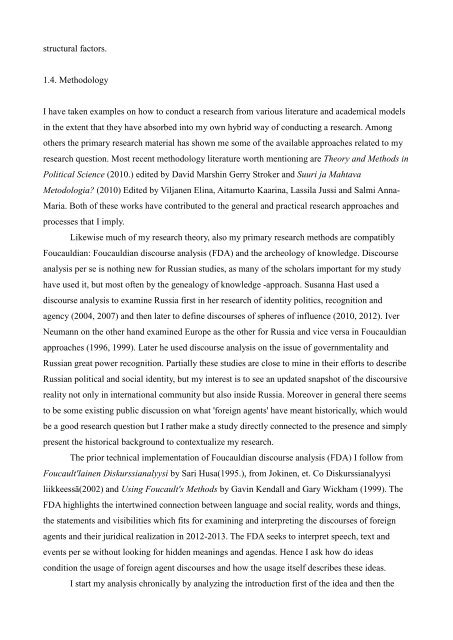Foreign Agents in Russia - Doria
Foreign Agents in Russia - Doria
Foreign Agents in Russia - Doria
Create successful ePaper yourself
Turn your PDF publications into a flip-book with our unique Google optimized e-Paper software.
structural factors.<br />
16<br />
1.4. Methodology<br />
I have taken examples on how to conduct a research from various literature and academical models<br />
<strong>in</strong> the extent that they have absorbed <strong>in</strong>to my own hybrid way of conduct<strong>in</strong>g a research. Among<br />
others the primary research material has shown me some of the available approaches related to my<br />
research question. Most recent methodology literature worth mention<strong>in</strong>g are Theory and Methods <strong>in</strong><br />
Political Science (2010.) edited by David Marsh<strong>in</strong> Gerry Stroker and Suuri ja Mahtava<br />
Metodologia? (2010) Edited by Viljanen El<strong>in</strong>a, Aitamurto Kaar<strong>in</strong>a, Lassila Jussi and Salmi Anna-<br />
Maria. Both of these works have contributed to the general and practical research approaches and<br />
processes that I imply.<br />
Likewise much of my research theory, also my primary research methods are compatibly<br />
Foucauldian: Foucauldian discourse analysis (FDA) and the archeology of knowledge. Discourse<br />
analysis per se is noth<strong>in</strong>g new for <strong>Russia</strong>n studies, as many of the scholars important for my study<br />
have used it, but most often by the genealogy of knowledge -approach. Susanna Hast used a<br />
discourse analysis to exam<strong>in</strong>e <strong>Russia</strong> first <strong>in</strong> her research of identity politics, recognition and<br />
agency (2004, 2007) and then later to def<strong>in</strong>e discourses of spheres of <strong>in</strong>fluence (2010, 2012). Iver<br />
Neumann on the other hand exam<strong>in</strong>ed Europe as the other for <strong>Russia</strong> and vice versa <strong>in</strong> Foucauldian<br />
approaches (1996, 1999). Later he used discourse analysis on the issue of governmentality and<br />
<strong>Russia</strong>n great power recognition. Partially these studies are close to m<strong>in</strong>e <strong>in</strong> their efforts to describe<br />
<strong>Russia</strong>n political and social identity, but my <strong>in</strong>terest is to see an updated snapshot of the discoursive<br />
reality not only <strong>in</strong> <strong>in</strong>ternational community but also <strong>in</strong>side <strong>Russia</strong>. Moreover <strong>in</strong> general there seems<br />
to be some exist<strong>in</strong>g public discussion on what 'foreign agents' have meant historically, which would<br />
be a good research question but I rather make a study directly connected to the presence and simply<br />
present the historical background to contextualize my research.<br />
The prior technical implementation of Foucauldian discourse analysis (FDA) I follow from<br />
Foucault'la<strong>in</strong>en Diskurssianalyysi by Sari Husa(1995.), from Jok<strong>in</strong>en, et. Co Diskurssianalyysi<br />
liikkeessä(2002) and Us<strong>in</strong>g Foucault's Methods by Gav<strong>in</strong> Kendall and Gary Wickham (1999). The<br />
FDA highlights the <strong>in</strong>tertw<strong>in</strong>ed connection between language and social reality, words and th<strong>in</strong>gs,<br />
the statements and visibilities which fits for exam<strong>in</strong><strong>in</strong>g and <strong>in</strong>terpret<strong>in</strong>g the discourses of foreign<br />
agents and their juridical realization <strong>in</strong> 2012-2013. The FDA seeks to <strong>in</strong>terpret speech, text and<br />
events per se without look<strong>in</strong>g for hidden mean<strong>in</strong>gs and agendas. Hence I ask how do ideas<br />
condition the usage of foreign agent discourses and how the usage itself describes these ideas.<br />
I start my analysis chronically by analyz<strong>in</strong>g the <strong>in</strong>troduction first of the idea and then the
















